Sir Joseph Neale McKenna [1] (1819 [2] – 15 August 1906) was an Irish banker and politician whose career extended from the elite home rule politics of the mid-nineteenth century to the fall of Charles Stewart Parnell, whom he supported in later years.
He was a Member of Parliament (MP) for Youghal from 1865 to 1868 and for South Monaghan from 1885 to 1892, representing the Home Rule League and its successor the Irish Parliamentary Party from 1874 to 1885 in the House of Commons of the United Kingdom of Great Britain and Ireland. He was an early participant in the Home Rule movement, led by Isaac Butt, and played a leading role in forming Irish Nationalist thinking on the over-taxation of Ireland. He was knighted in 1867, and was a magistrate and Deputy Lieutenant for County Cork and a magistrate in County Waterford.
A Catholic, [3] he was born in Dublin, the son of Michael McKenna, and educated at Trinity College Dublin. In 1842 he married Esther Louise Howe of Dublin, and after her death married Amelia, widow of R. W. Hole. He was called to the Irish bar in 1849. [4] He was an able financier, was chairman of the National Bank of Ireland and became wealthy.
He entered Parliament as member for Youghal, Co. Cork, at the general election of 1865, defeating the incumbent Isaac Butt, the later Home Rule leader, by 122 to 30 votes, the electorate being a tiny 237. Both stood as Liberals. McKenna lost the seat to Christopher Weguelin, also a Liberal, in 1868 by 127 votes to 106, and accepted defeat although Weguelin's election was declared void on account of bribery (which was a viable tactic with such a small electorate).
McKenna joined the Home Government Association in September 1873. He attended the founding conference of the Home Rule League in Dublin on 18–21 November 1873 and moved one of the resolutions. In 1874 McKenna stood as a Home Rule candidate at Youghal and regained the seat. He also defeated a renewed Conservative challenge in 1880.
McKenna worked closely with Isaac Butt and took part in parliamentary obstruction with the more radical Irish members including Joseph Biggar. But in the vital vote of 17 May 1880 in which Parnell displaced William Shaw as chairman of the Irish Parliamentary Party, McKenna voted for Shaw.
The 1885 general election was fought on new boundaries with a greatly enlarged electorate. McKenna had insufficient support to stand in the new East Cork constituency into which Youghal was absorbed, and moved to South Monaghan, where he defeated a Conservative by nearly five to one in 1885 and a Unionist by a similar margin in 1886.
When the Irish Parliamentary Party split in December 1890 over Parnell's leadership, McKenna joined the Parnellite minority which supported Parnell. He was one of only two MPs who had opposed Parnell's takeover in the vote of May 1880 who supported Parnell in the split of 1890, the other being Richard Power.
McKenna retired at the subsequent general election in 1892, being then well over 70.
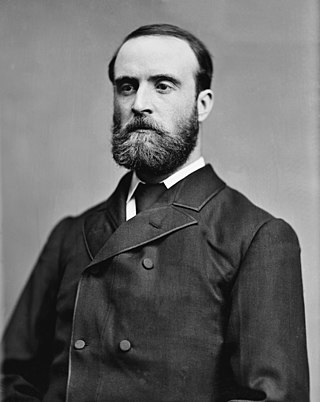
Charles Stewart Parnell was an Irish nationalist politician who served as a Member of Parliament (MP) from 1875 to 1891, also acting as Leader of the Home Rule League from 1880 to 1882 and then Leader of the Irish Parliamentary Party from 1882 to 1891. His party held the balance of power in the House of Commons during the Home Rule debates of 1885–1886.
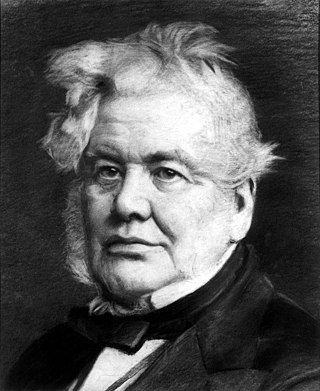
Isaac Butt was an Irish barrister, editor, politician, Member of Parliament in the House of Commons of the United Kingdom, economist and the founder and first leader of a number of Irish nationalist parties and organisations. He was a leader in the Irish Metropolitan Conservative Society in 1836, the Home Government Association in 1870, and the Home Rule League in 1873. Colin W. Reid argues that Home Rule was the mechanism Butt proposed to bind Ireland to Great Britain. It would end the ambiguities of the Act of Union of 1800. He portrayed a federalised United Kingdom, which would have weakened Irish exceptionalism within a broader British context. Butt was representative of a constructive national unionism. As an economist, he made significant contributions regarding the potential resource mobilisation and distribution aspects of protection, and analysed deficiencies in the Irish economy such as sparse employment, low productivity, and misallocation of land. He dissented from the established Ricardian theories and favoured some welfare state concepts. As editor he made the Dublin University Magazine a leading Irish journal of politics and literature.
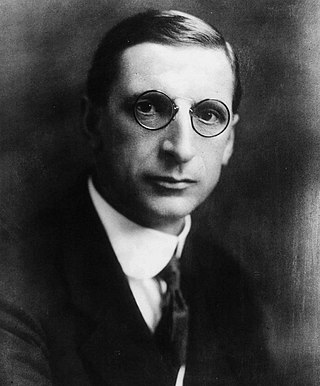
The 1918 Irish general election was the part of the 1918 United Kingdom general election which took place in Ireland. It is now seen as a key moment in modern Irish history because it saw the overwhelming defeat of the moderate nationalist Irish Parliamentary Party (IPP), which had dominated the Irish political landscape since the 1880s, and a landslide victory for the radical Sinn Féin party. Sinn Féin had never previously stood in a general election, but had won six seats in by-elections in 1917–18. The party had vowed in its manifesto to establish an independent Irish Republic. In Ulster, however, the Unionist Party was the most successful party.
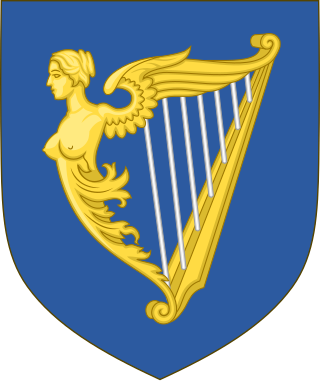
The Irish Parliamentary Party was formed in 1874 by Isaac Butt, the leader of the Nationalist Party, replacing the Home Rule League, as official parliamentary party for Irish nationalist Members of Parliament (MPs) elected to the House of Commons at Westminster within the United Kingdom of Great Britain and Ireland up until 1918. Its central objectives were legislative independence for Ireland and land reform. Its constitutional movement was instrumental in laying the groundwork for Irish self-government through three Irish Home Rule bills.
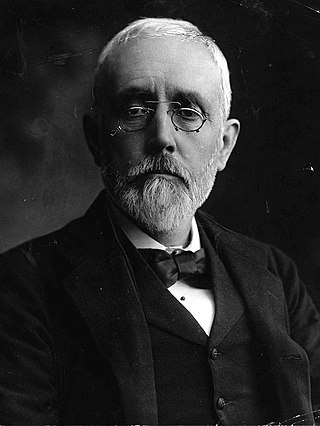
John Dillon was an Irish politician from Dublin, who served as a Member of Parliament (MP) for over 35 years and was the last leader of the Irish Parliamentary Party. By political disposition Dillon was an advocate of Irish nationalism, originally a follower of Charles Stewart Parnell, supporting land reform and Irish Home Rule.

The Home Rule League (1873–1882), sometimes called the Home Rule Party, was an Irish political party which campaigned for home rule for Ireland within the United Kingdom of Great Britain and Ireland, until it was replaced by the Irish Parliamentary Party. The Home Rule Confederation of Great Britain was a sister organisation in Great Britain.

Justin McCarthy was an Irish nationalist, journalist, historian, novelist and politician. He was a Member of Parliament (MP) from 1879 to 1900, taking his seat in the House of Commons of the United Kingdom of Great Britain and Ireland.
The Nationalist Party was a term commonly used to describe a number of parliamentary political parties and constituency organisations supportive of Home Rule for Ireland from 1874 to 1922. It was also the name of the main Irish nationalist Nationalist Party in Northern Ireland from 1921 to 1978.

Daniel Desmond Sheehan, usually known as D. D. Sheehan was an Irish nationalist, politician, labour leader, journalist, barrister and author. He served as Member of Parliament (MP) in the House of Commons of the United Kingdom of Great Britain and Ireland representing Mid-Cork from 1901 to 1918, a constituency comprising the districts of Ahadallane, Ballincollig, Ballyvourney, Blarney, Coachford, Farran, Inchigeelagh, Macroom, Millstreet and Shandangan. As co-founder and President of the Irish Land and Labour Association, he was credited with considerable success in land reform, labour reforms and in rural state housing. From 1909, he was General Secretary of the Central Executive of the All-for-Ireland League, favouring a policy of National reconciliation between all creeds and classes in Ireland. During World War I he served as Irish regiments officer with the 16th (Irish) Division in France, 1915–16. He resigned his parliamentary seat in 1918 and lived in England for several years, returning to Dublin following the ending of the civil war, when he was appointed editor of the Dublin Chronicle.
Cork City was a parliamentary constituency in Ireland, represented in the Parliament of the United Kingdom. From 1880 to 1922 it returned two members of parliament (MPs) to the House of Commons of the United Kingdom of Great Britain and Ireland. From 1922 it was not represented in the UK Parliament, as it was no longer in the UK.
Bandon was a Parliamentary constituency covering the town of Bandon in County Cork, Ireland. From 1801 to 1885 it elected one Member of Parliament (MP) to the House of Commons of the United Kingdom of Great Britain and Ireland.
Dundalk was a parliamentary borough constituency in Ireland, which returned one Member of Parliament (MP) to the House of Commons of the Parliament of the United Kingdom. It was an original constituency represented in Parliament when the Union of Great Britain and Ireland took effect on 1 January 1801, replacing the Dundalk constituency in the Parliament of Ireland.
Youghal was a United Kingdom Parliament constituency in Ireland returning one MP. It was an original constituency represented in Parliament when the Union of Great Britain and Ireland took effect on 1 January 1801.
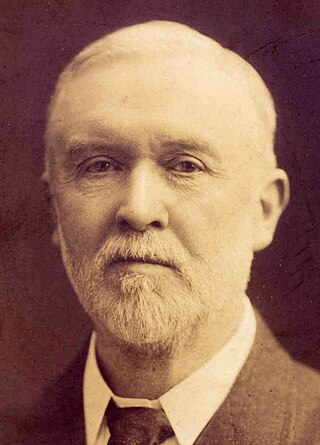
John Joseph Clancy, usually known as J. J. Clancy, was an Irish nationalist politician and Member of Parliament (MP) in the House of Commons for North Dublin from 1885 to 1918. He was one of the leaders of the later Irish Home Rule movement and promoter of the Housing of the Working Classes (Ireland) Act 1908, known as the Clancy Act. Called to the Irish Bar in 1887, he became a King's Counsel in 1906.
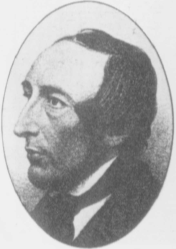
John Martin was an Irish nationalist activist who shifted from early militant support for Young Ireland and Repeal, to non-violent alternatives such as support for tenant farmers' rights and eventually as the first Home Rule MP, for Meath 1871–1875.
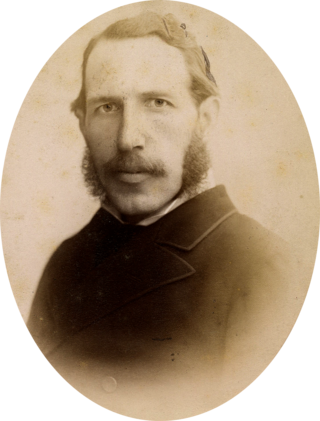
John O'Connor Power was an Irish Fenian and a Home Rule League and Irish Parliamentary Party politician and as MP in the House of Commons of the United Kingdom of Great Britain and Ireland represented Mayo from June 1874 to 1885. From 1881, he practised as a barrister specialising in criminal law and campaigning for penal reform.

Jeremiah JordanJ.P. was an Irish nationalist politician from County Fermanagh. He was a Member of Parliament (MP) from 1885 to 1892, and from 1893 to 1910, taking his seat in the House of Commons of the United Kingdom of Great Britain and Ireland.
Garrett Michael Byrne was an Irish nationalist and MP in the House of Commons of the United Kingdom of Great Britain and Ireland and as member of the Irish Parliamentary Party represented Co. Wexford, 1880–83, and West Wicklow, 1885–92. He was a strong supporter of Charles Stewart Parnell.
William Shaw was an Irish Protestant nationalist politician. He was a Member of Parliament (MP) in the House of Commons of the United Kingdom of Great Britain and Ireland and one of the founders of the Irish home rule movement.
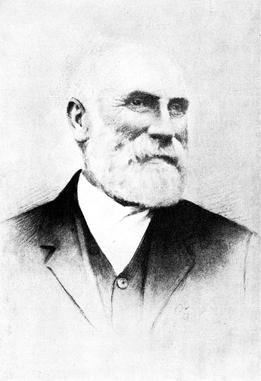
Andrew Joseph Kettle (1833–1916) was a leading Irish nationalist politician, progressive farmer, agrarian agitator and founding member of the Irish Land League, known as 'the right-hand man' of Charles Stewart Parnell. He was also a much admired old friend of the nationalist politician, Frank Hugh O'Donnell, and the poet and novelist Katharine Tynan.